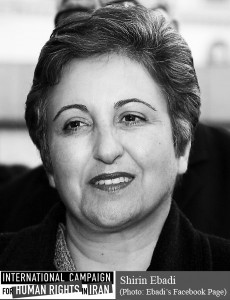Shirin Ebadi: Politics Rule the Iranian Judiciary
 The 2003 Nobel Peace Laureate Shirin Ebadi, who heads Center for Human Rights Defenders in Iran, was interviewed by International Campaign for Human Rights. Regarding Iranian Judiciary’s recent actions including executions of two political dissidents and group execution sentence for several other protesters she said: “Unfortunately, the Iranian Judiciary has fallen short of justice and politics are determining its core and actions now. This is why we are now witnessing sentences which are even contradictory to Islamic Republic’s very own approved laws. In other words, the government approves laws which it refuses to obey itself. They are accusing people of heretics, moharebeh, when all they have done is to participate in street protests or sending an electronic mail. In some cases all the email contained was a piece of news. They won’t let suspects’ attorneys attend trials and appoint public defenders for suspects. These are all examples of actions which contradict The Criminal Case Review Policies and demonstrate that trials are political. When politics enters a courtroom, justice leaves that courtroom.”
The 2003 Nobel Peace Laureate Shirin Ebadi, who heads Center for Human Rights Defenders in Iran, was interviewed by International Campaign for Human Rights. Regarding Iranian Judiciary’s recent actions including executions of two political dissidents and group execution sentence for several other protesters she said: “Unfortunately, the Iranian Judiciary has fallen short of justice and politics are determining its core and actions now. This is why we are now witnessing sentences which are even contradictory to Islamic Republic’s very own approved laws. In other words, the government approves laws which it refuses to obey itself. They are accusing people of heretics, moharebeh, when all they have done is to participate in street protests or sending an electronic mail. In some cases all the email contained was a piece of news. They won’t let suspects’ attorneys attend trials and appoint public defenders for suspects. These are all examples of actions which contradict The Criminal Case Review Policies and demonstrate that trials are political. When politics enters a courtroom, justice leaves that courtroom.”
Counting the illegal characteristics of executions of Arash Rahmaninia and Mohammad Alizamani, and describing the political trials of dissidents, she said: “This is how we witness news which are regretful: executions of two young men who according to their courageous attorney, Ms. Nasrin Sotoudeh–who wasn’t even allowed in their trial courtroom and the two had been arrested two months prior to Iranian presidential elections. The two men were promised release if they confessed in court that they had participated in street protests and intended to cause riots and overthrow the Islamic Republic’s regime. They believed these promises and confessed in court and unfortunately they were executed. Their arrests pre-dated the elections and their confessions were inadmissible as a result. The trials were held behind closed doors and far from their attorneys. It is worth noting that their lawyer was not allowed to enter the trial courtroom and for suspects with such heavy charges, the court appointed public defenders. I would very much like to know the name of that public defender. All his colleagues will have to know who is the individual who helped the Judiciary to execute two young men. They have not announced the lawyer’s name and I have heard that the appointed public defender has requested anonymity
The 2003 Peace Nobel Laureate said about the Head of Judiciary’s recent statements about political pressure on the Judiciary for punishing the suspects: “After many objections were voiced about the Judiciary’s conduct since Mr. Larijani’s appointment, he has in fact defended the Judiciary’s performance, saying that even though there is a lot of political pressure on the Judiciary, it is standing its ground. In fact he confirmed the Judiciary’s conduct, including the two executions.”
Continuing to describe what has been happening to human rights activists, Head of Center for Human Rights Defenders said: “Unfortunately, the situation of human rights defenders in Iran is very alarming. The government intervenes in their work on different pretexts. All recognized human rights defenders in Iran are either in prison or are living in hiding or have left Iran. In 1998, the General Assembly of United Nations approved the Declaration on the Right and Responsibility of Individuals, Groups and Organs of Society to Promote and Protect Universally Recognized Human Rights and Fundamental Freedoms, and the Iranian government voted in favor of this Declaration. In this Declaration, governments are asked to assist defenders of human rights. Working on human rights issues is a humanitarian act and governments must facilitate such activities. Now we can see what the Iranian government is doing with defenders of human rights. They are either in the corners of prisons awaiting long-term jail sentences or have gone into hiding or have had to leave Iran.”
Ebadi ended talking about the role of human rights defenders in Iran by saying: “Human rights defenders in Iran are acting on their most difficult historical responsibilities. Accepting all the risks, they continue to defend people’s rights through writing, talking, and defense and accept all the dangers and consequences. These known human rights defenders of Iran will change the Iranian history.”






